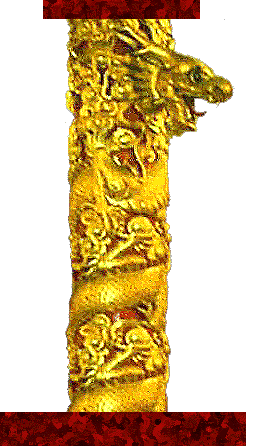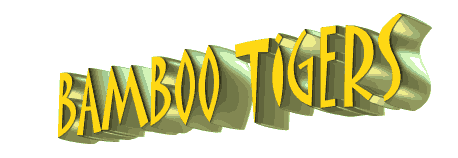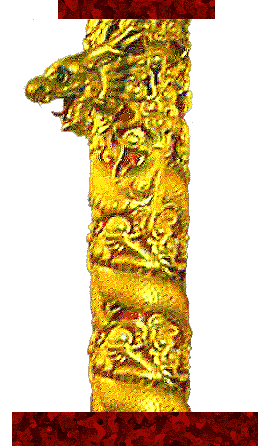| |
Mrs. Louie dunked another dim sum saucer into sudsy water. The Asia Garden was popular for its luncheon of dim sum, meaning "touch the heart" in Chinese. To judge from the mountain of small plates, it seemed that the pastry-wrapped shrimp, steamed buns stuffed with barbecued pork, and other delicacies had touched many hearts in San Francisco's Chinatown. The restaurant specialized in Hong-Kong style, without the chili and spice of Hunan and Szechuan cuisine, rolling the dim sum on carts for diners to select at will in old-country teahouse tradition. Bills were tallied up according to the number of emptied saucers.
Although she was a good Chinese cook at home, Mrs. Louie's job at the restaurant was dishwasher, menial labor being the only work available in America for immigrants of her class from Hong Kong, Taiwan and Mainland China. She worked hard and hoped for a better life for her 15-year-old son, Lincoln. There had been no time for her to learn English. Mastery of that language she left to him, a student at Galileo High School.
A scan of his grades revealed that Lincoln Louie did moderately well at school until his early teens, but his mother was scarcely aware of his slipping marks at Galileo. She could not read his report card, of course, and had to accept whatever he told her about his progress. She had little time to pay attention to the friends he brought to the house and could hardly have judged them in any case, as they were, to her, a new breed. They seemed nice enough, but who of her generation and foreign background could have assessed the worth of boys transplanted to another world and struggling to survive?
She loved her son, as a mother does. He was not a handsome boy perhaps, but seemed to be growing taller than other males in her family back in Hong Kong. He had a sweet smile and good teeth. His features were regular, and in her presence his eyes sparkled with good humor. He wasn't a sullen boy, but neither did he communicate much with his mother. She would not have understood his problems anyway. He faced an alien culture more or less alone.
He did have his needs. He needed to belong. He needed friends to buffer the harshness of life in a foreign country where his family had little money for middle-class amenities. He would always be an outsider in one way or another because of his heavy accent, marginal English and Asian face. He did not choose the social structure in which he found himself at school. It existed long before he got there.
There were the blacks on one side, and the whites on another. There were the American-born Chinese, known as A.B.C.'s, and the foreign born, dubbed F.O.B.'s ("fresh-off-the-boat" Chinese immigrants), not to mention the multiplicity of other ethnic groups crowding San Francisco with an immigrant population more diverse than most American cities. That there were more Asians in San Francisco proportionately than elsewhere in the country didn't matter much to Lincoln Louie. What mattered most was that Galileo High School had a predominance of F.O.B.'s. He had, at least, been cast with his own kind.
The A.B.C.'s sarcastically referred to F.O.B.'s like Lincoln as jook kok, a hollow piece of bamboo stalk sealed at one end, signifying that they were cut off from American culture on that end and open to Chinese culture on the other. Not to be outdone, the F.O.B.'s maliciously termed the A.B.C.'s jook sing, or hollow bamboo sealed at both ends, having no part of either American or Chinese culture. Even within the F.O.B.'s, intense competition raged with regard to whether one had emigrated from Hong Kong, Taiwan or the Mainland.
Among the gang-oriented youths of both groups, rivalry related to city district, school, Asian point of origin, or gang affiliation. Age mattered, too. You were too young or too old or just right. Lincoln Louie and others like him were made to feel alien to both the Chinese and the American cultures. Bamboo stalks grow fast and wild. These displaced youths fell into a dangerous culture of their own, untamed by either of the others but trapped as predators in an ethnic jungle which could neither contain them nor let them go. They became, in a figurative sense, not bamboo stalks, but bamboo tigers.
Lincoln Louie faced peer pressures unknown to the majority of American school children. It seemed that he had but to move from one classroom to another to face a potential enemy there or a possible ally here. His own choice didn't count for much--they picked you out on their own. "Yeah, man, I seen him talking to a Joe Boy in the cafeteria. The asshole's gotta be one of them, y'know." Whether Lincoln knew he was talking to a Joe Boy or a Wah Ching or a Hop Sing Boy or a Dai Ben made no difference. He was guilty by association in any case.
As it happened, he did indeed fall among the Joe Boys, a group spun off from the Chung Ching Yee Gang.
The Joe Boys were named to honor convicted felon Joe Fong, a former member of the Wah Ching Gang who broke away and formed his own gang in 1971. Joe had been an original member of the Chinatown Nine, Wah Ching whom police recognized as potential leaders on their own. He had taken several Wah Ching out of the gang with him and then sought new recruits, frequently by intimidation. Himself an F.O.B. from Macao, he set precedent in allowing A.B.C.'s and other Asians who were not Chinese to join his gang. He organized them with strict rules and regulations, but the governing principle was "once a member, always a member."
Not all gang members were recruited by intimidation, nor were all reduced to straitened circumstances of life. Some came from solidly middle-class families of restaurateurs, shop owners and public officials. Such youths joined because they were game for any chance at the thrill of criminal involvement.
Joe Fong wanted all of Chinatown's illicit activities under his control. Chinatown remained the clandestine gambling center it had always been. In addition, the rackets there included extortion, protection, robbery and burglary, with some involvement in prostitution and dope. By all accounts, the lucre was abundant, and the dominant groups, frequently under the aegis of the Tongs--Chinatown's so-called "benevolent associations"--reaped considerable profits.
In the mid-1970's, police halted a truck on the San Francisco-Oakland Bay Bridge that contained $75,000 worth of firecrackers to be offered for sale on the streets of Chinatown. No one knew how many other trucks had already carried their precious cargo inside the pailou arch with its stone foo dogs that guard the Grant Avenue portal to San Francisco's renowned Chinese quarter. A common sight around the 4th of July, then and now, was that of diminutive Chinese kids stopping cars and pedestrians on Grant Avenue to hawk the latest in fireworks to anyone who would buy. Stowed away in "safe" houses close by, dangerous contraband was frequently transferred hastily to the idling cars of "regular" customers from all around the Bay Area. This activity led, indirectly, to the Golden Dragon massacre, worst in the history of San Francisco.
The gang warfare culminating in that massacre began in 1969 with the fatal stabbing of a seaman in Chinatown. It intensified in 1970--gang against gang, one gang sometimes joining another in retaliation against a third, and so forth down to the present day--as is reflected in statistics numbering more than 50 homicides and countless assaults. Many of the victims were gunned down in the streets in broad daylight as blatantly as any Mafia hit:
Glen Fong, 19, was shot to death on a Chinatown street in March 1970.
Teddy Tam, 21, was stabbed to death in June 1970 at a San Francisco City College dance.
Larry Miyata, 16, died on a Chinatown street in September of that year, felled by bullets.
Richard Leung, 17, was shot in the back on Chinatown's Jackson Street at 4:30 on an afternoon in October 1971. He staggered around the corner pursued by three rival gang assailants--all teen-agers--and fell to the sidewalk among the throng of tourists on busy Grant Avenue. Each of the killers fired into his body before one calmly administered a coup de grace to the back of his head. Then they disappeared into an alley, leaving two wounded bystanders in their wake.
Anton Wong, 24, leader of the Wah Ching, fell under a barrage of bullets fired by Joe Fong's 15-year-old brother, Chung Wai, at noon on the corner of Jackson and Powell in May 1973. Chung Wai, who lived a block away at the Ping Yuen housing project on Pacific Avenue, simply ambled up to his brother's arch rival and started firing. When Anton fell backward from the impact, his killer stood over him and blasted him repeatedly. The teen-ager later turned himself in to the authorities and was convicted of first-degree murder. Among his grievances against Anton Wong, he listed the older man's role in sending Joe Fong to prison and a foiled attempt by Wah Ching to kidnap Chung Wai on the Number 30 Stockton bus. No rose himself, Anton was, at the time of his killing by Joe's brother, under felony charges of complicity in a vicious assault.
Wayne Fung, 19, leader of a younger faction of Wah Ching, was blown away in August 1973 by a Joe Boy, Eddie Yuen, while working his part-time job at a service station in the Sunset District of the city. Horrified customers watched while Wayne's determined assailant chased the boy among the gasoline pumps and shot him three times in the back and once each in the head, the buttocks, the left hand, and the left arm. As well planned as a military operation, the assassination involved 11 individuals in various stages of its execution. Eddie Yuen was eventually convicted on a charge of first-degree murder.
The gang-related skirmishes continued unabated for years.
| |
|









